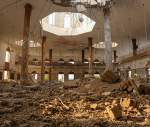You are here
Duterte’s dubious defence
Mar 31,2018 - Last updated at Mar 31,2018
NEW YORK — Philippine President Rodrigo Duterte likes to talk tough and act tougher. He has joked about wanting to commit sexual assault against a murdered missionary, applied his favourite epithet — “son of a whore” — to Pope Francis and Barack Obama, and boasted about personally killing criminals when he was the mayor of Davao City on the southern island of Mindanao.
Most significantly, Duterte has publicly encouraged the Philippine national police to murder suspected drug dealers and users, promising to shield officers who do so from legal consequences. Many police have complied; since Duterte took office in June 2016, an estimated 12,000 officially sanctioned drug-related murders have been documented.
But after nearly two years of perfecting his strongman persona, Duterte is now acting vulnerable. In February, Fatou Bensouda, the chief prosecutor of the International Criminal Court (ICC), opened a preliminary investigation into allegations of crimes against humanity connected to the Philippines’ “war on drugs”. Duterte’s response was as unconvincing as it was desperate.
In a rambling 15-page rebuttal to the ICC, Duterte presented a defence based more on fiction than fact. For example, without a hint of irony, he argued that an investigation, trial and indictment would deprive him of life, liberty and property, fundamental freedoms that are guaranteed by the Philippine Constitution. If he was not serious, it would be a risible argument, the ICC cannot deprive him of his life — as he has deprived thousands of Filipinos of theirs — because the court does not have the authority to impose the death penalty.
No less dubiously, Duterte claimed that the ICC’s investigation was yet another example of a “systematic assault by the United Nations” against his country, as “evidence”, he cited an ongoing inquiry launched by Agnes Callamard, the UN special rapporteur on extrajudicial killings. His concerns might have had more merit had he not indulged in a profanity-laced attack on Callamard, in which he called the highly respected rapporteur “malnourished” and “skinny”. Instead, Duterte’s allegations were just more noise from a foul-mouthed authoritarian.
Duterte also argued that Bensouda cannot proceed against him because his position gives him immunity. But that, too, is wrong. The Rome Statute, the treaty that created the ICC and was ratified by the Philippines in August 2011, is very clear on this point. One’s “official capacity as a head of state or government, a member of a government or parliament, an elected representative or a government official shall in no case exempt a person from criminal responsibility”.
And, finally, Duterte suggested that the ICC had not met the requirement of “complementarity”, which stipulates that the court has jurisdiction only when a state is unwilling or unable to prosecute. But an impartial trial in the Philippines would be impossible, given Duterte’s attacks on judicial officials who oppose him. For example, in February 2017, Duterte imprisoned Senator Leila de Lima, a former secretary of justice, for criticising his war on drugs.
Duterte capped off his response to the ICC by offering one more insult: a pledge to withdraw the Philippines from the Rome Statute. Although the United States, China, and India have never ratified the treaty, Burundi is the only country ever to have left the world’s top war-crimes tribunal. To critics like Lima, following the lead of a country plagued by its own record of human-right abuses would be political suicide for Duterte. I tend to agree.
Duterte has rarely lost a verbal fight. But this time, the ICC may get the final word. While Duterte’s petition suggests he understands that withdrawal from the Rome Statute will take a year, he ignores the fact that Bensouda would have jurisdiction to indict him, regardless of the Philippines’ future standing with the court, so long as a full investigation is launched before then.
Cracks are emerging in Duterte’s political armor. If the ICC’s preliminary investigation does lead to a formal indictment, as I hope it will, the case could quickly ensnare top police officials, helping to end the wave of extrajudicial killings that have sown fear across the country. These are still early days in the ICC’s investigation, but, as Duterte’s initial reaction demonstrates, being a tough guy is nearly always indefensible.
Aryeh Neier, president emeritus of the Open Society Foundations and a founder of Human Rights Watch, is the author of “The International Human Rights Movement: A History”. Copyright: Project Syndicate, 2018. www.project-syndicate.org












